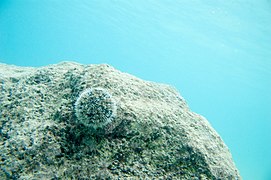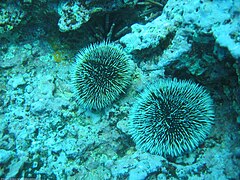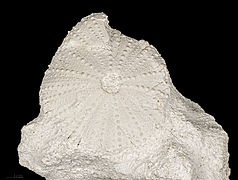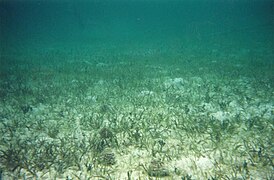Tripneustes
Appearance
| Tripneustes | |
|---|---|

| |
| Tripneustes ventricosus | |
| Scientific classification | |
| Domain: | Eukaryota |
| Kingdom: | Animalia |
| Phylum: | Echinodermata |
| Class: | Echinoidea |
| Order: | Camarodonta |
| Family: | Toxopneustidae |
| Genus: | Tripneustes L. Agassiz, 1841 |
Tripneustes is a genus of sea urchins belonging to the family Toxopneustidae.[1]
Species
[edit]The genus contains four extant species:[1]
| Image | Scientific name | Distribution |
|---|---|---|
 |
Tripneustes depressus Agassiz, 1863 | eastern Pacific Ocean, occurring in Mexico, on the western coast of Central America, in Panama, in Ecuador and around the Galápagos Islands |
 |
Tripneustes gratilla (Linnaeus, 1758) | Indo-Pacific, Hawaii, the Red Sea, and The Bahamas. |
| Tripneustes kermadecensis Bronstein, Kroh, Tautscher, Liggins & Haring, 2017 | southern Pacific Ocean, off the Kermadec Islands | |
 |
Tripneustes ventricosus (Lamarck, 1816) | western Atlantic Ocean, the Caribbean Sea and Gulf of Mexico |
This genus contains many extinct species, such as:
- † Tripneustes antiquus Duncan & Sladen, 1855
- † Tripneustes californicus Kew, 1920
- † Tripneustes gahardensis (Seunes)
- † Tripneustes magnificus Nisiyama, 1966
- † Tripneustes parkinsoni (Agassiz, 1847)
- † Tripneustes pregratilla McNamara and Kendrick 1994
- † Tripneustes proavia Duncan & Sladen, 1855
- † Tripneustes schneideri Boehm
- † Tripneustes tobleri Jeannet, 1928a
Distribution
[edit]These sea urchins have been recorded as fossils from Miocene to Recent (from 15.97 to 0.0 Ma). Fossils have been found in the sediments of Southern Europe, Mediterranean and North Africa, Caribbean, Western coast of America and throughout the Indo-Pacific.[2]
Gallery
[edit]-
Several Tripneustes in seagrass, Grahams Harbour, San Salvador Island, Bahamas
References
[edit]- ^ a b Kroh A, Mooi R, eds. (2019). "Tripneustes L. Agassiz, 1841". World Echinoidea Database. World Register of Marine Species. Retrieved 21 January 2019.
- ^ a b Natural History Museum
- ^ Paleobiology Database






